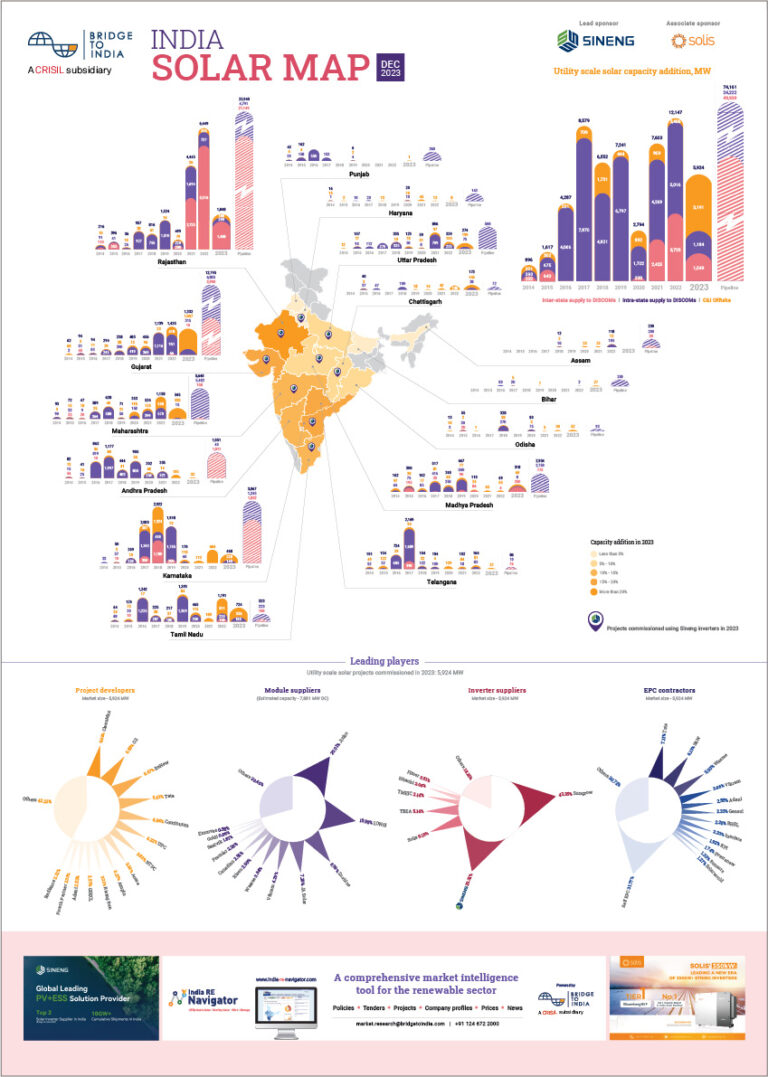ArcelorMittal, one of India’s largest steel producers, has signed an agreement with Greenko to procure a 250 MW inter-state round-the-clock (RTC) open access (OA) renewable power project. Power would be supplied from a combined 975 MW wind-solar power plant integrated with a pumped storage project in Andhra Pradesh. The project is expected to be commissioned by H1 2024 by Greenko in EPC mode at an estimated cost of USD 600 million. It would allow ArcelorMittal to achieve over 20% renewable penetration for its 10 million tonne manufacturing plant in Hazira, Gujarat. Earlier this month, Adani also announced a separate agreement with Greenko to procure 6 GWh pumped hydro capacity from Greenko projects in Madhya Pradesh and Rajasthan to enable consumption of 1 GW RTC renewable power at its manufacturing facilities in Gujarat. It is worth noting that landed cost of RTC renewable power is expected to be materially higher than cost of power from all other sources.
- Large companies are coming under increasing pressure to accelerate their decarbonisation plans;
- 100% ISTS waiver for OA projects commissioned by June 2025 is expected to result in massive surge corporate renewable market over the next three years;
- Domestic equipment suppliers and EPC contractors are expected to be the main beneficiaries;
The two deals validate Greenko’s unique strategy of proactively developing pumped hydro projects across India in anticipation of RTC power demand particularly as battery storage viability remains a few years away. Separately, Reliance Industries has obtained transmission connectivity approval for a 500 MW open access renewable power project for its Jamnagar refinery. The company is believed to be considering a multi-fold expansion of this project in the next few years. These developments reflect a fundamental shift in the corporate renewable market, which could be attributed to three factors. One, corporates making pledges to achieve net zero emissions status and consume 100% renewable power are coming under increasing pressure to accelerate their decarbonisation plans. Their primary focus, when considering renewable power procurement, has changed from just reducing cost of power procurement to increasing share of renewable power consumption and reducing carbon emissions. They are prepared to procure RTC renewable power even if it means an increase in cost of power. Larger corporates are also pushing their suppliers, including small businesses and SMEs, to increase adoption of renewable power across the supply chain. The two other factors are extension of inter-state transmission charges waiver to open access projects commissioned by June 2025 and a realisation that renewable power cost is not going to decline forever. Capex spike, increase in GST rates and looming 40% BCD on modules have nearly wiped out cost advantage of renewables over grid power in many states.
Figure 1: Landed cost comparison for industrial consumers connected at 33 kV, INR/ kWh

Source: BRIDGE TO INDIA research
Note: Grid power cost includes variable energy charges, surcharges, taxes and duties.
The behavioural shift is opportune at a time when the OA renewable market has been struggling in face of state level policy resistance and cost uncertainty.
Figure 2: OA capacity addition, MW

Source: BRIDGE TO INDIA research
Market activity is expected to see a massive surge over the next three years with 100% captive model likely to dominate. Main beneficiaries are expected to be domestic equipment suppliers and EPC contractors.












